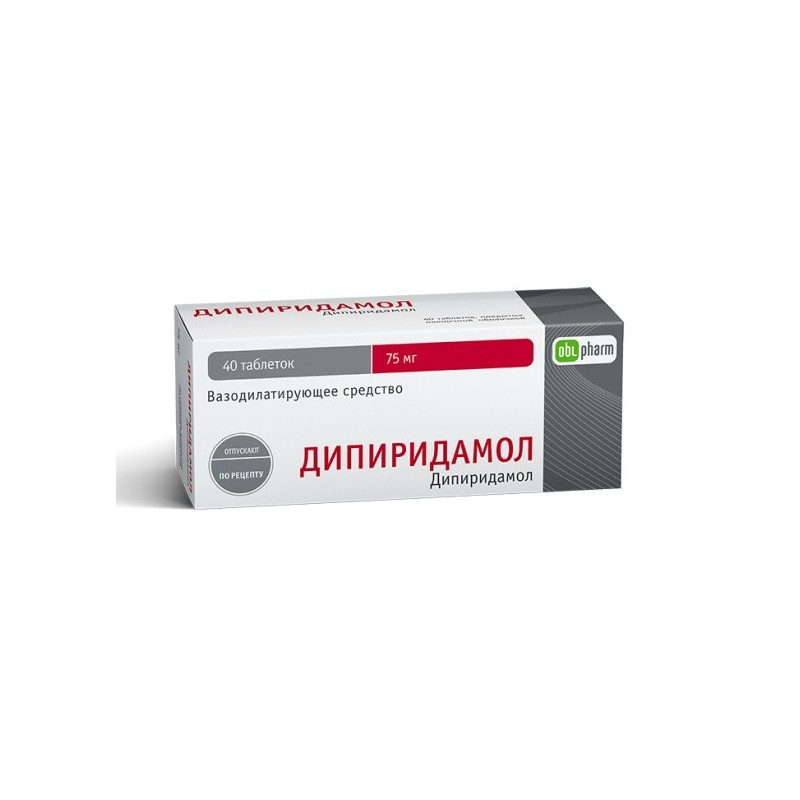



 All payments are encrypted via SSL
All payments are encrypted via SSL
 Full Refund if you haven't received your order
Full Refund if you haven't received your order
1 coated pill contains:
active substance: dipyridamole 25, 50 or 75 mg; auxiliary components: milk sugar (lactose), Kollidon VA64 (copolyvidone), Magnesium stearate, microcrystalline cellulose, sodium croscarmellose (primelloza), hydroxypropylmethylcellulose (hypromellose), talc (colloidal silicon dioxide), titanium dioxide-80, 80-ti-80, hypo-cellulose, talc (silica colloid), titanium dioxide-80, titan dioxide-80, hypromellose; yellow E104.
Pharmacotherapeutic group: vasodilating agent
Pharmacological action: Dipyridamole has a inhibitory effect on platelet aggregation, improves microcirculation. It has a vasodilating effect.
As a pyrimidine derivative, dipyridamole is an Interferon inducer and has a modulating effect on the functional activity of the interferon system, increases the decreased production of interferon alpha (a) and gamma (g) by white blood cells in vitro.
Dipyridamol elevates non-specific antiviral resistance to viral infections.
Pharmacokinetics: The maximum concentration of dipyridamole in plasma is achieved within 1 hour after ingestion. Dipyridamole is almost completely bound to blood proteins. The accumulation of dipyridamole occurs in myocardiocytes and in erythrocytes.Dipyridamole is metabolized in the liver by binding to glucuronic acid. The half-life is 20-30 minutes in the first phase, in the second phase - about 10 hours. Cumulation is possible (mainly in patients with impaired liver function). It is displayed with bile in the form of a monoglucuronide.
Treatment and prevention of cerebral circulatory disorders of ischemic type, dyscirculatory encephalopathy.
Prevention of arterial and venous thrombosis and their complications, prevention of thromboembolism after the operation of prosthetic heart valves.
Prevention of placental insufficiency in complicated pregnancy.
As part of complex therapy for any violations of microcirculation.
As an interferon inducer and immunomodulator for the prevention and treatment of influenza, ARVI.
With care The lactation period, children's age (up to 12 years - the lack of sufficient experience).
Palpitations, bradycardia, thrombocytopenia, changes in the functional properties of platelets, bleeding, feeling of ear congestion, noise in the head, arthritis. You may experience vomiting, diarrhea, epigastric pain, as well as symptoms such as weakness, dizziness, nausea, headache, myalgia, rhinitis. Usually these side effects disappear with long-term use of dipyridamole.
As a result of the potential vasodilator action, high-dose dipyridamole may cause hypotension, tidal sensation and tachycardia, coronary robbery (at doses of more than 225 mg per day).
Hypersensitivity reactions may occur as a rash or urticaria.
If side effects occur, you must inform the doctor.
Xanthine derivatives (coffee, tea) can weaken the vasodilator and antithrombotic effect of Dipyridamole. The use of Dipyridamole with both direct and indirect anticoagulants (heparin) and thrombolytic agents or Acetylsalicylic acid increases the risk of hemorrhagic complications, which must be considered when sharing.
Dipyridamole may enhance the effect of antihypertensive drugs.
Dipyridamole may impair the anticholinergic properties of cholinesterase inhibitors.
The antiaggregative effect is enhanced when taking antibiotics of cephalosporins (cefemandol, cefeperazone, cephatetan), penicillin antibiotics, tetracyclines, chloramphenicol, beta-lactams, nicotinic acid.
Antacids reduce the maximum concentration due to reduced absorption.
Unless otherwise prescribed by a doctor, the following dosing regimens are recommended:
To reduce platelet aggregation, it is recommended to use Dipiridimol in a dose of 75-225 mg / day in several doses. In severe cases, the dose may be increased to 600 mg / day.
For the prevention of thromboembolic syndrome, stent thrombosis and coronary artery bypass grafts - 50 mg along with ASA on the first day, then 100 mg, followed by 4 times a day (canceled 7 days after surgery, subject to continued administration of ASK 325 mg / day) or 100 mg 4 times a day for 2 days before surgery and 100 mg 1 hour after surgery (if necessary in combination with warfarin).
For the prevention of influenza and other acute respiratory diseases, especially during epidemics, take the following scheme: 50 mg / day 1 time in 7 days for 4-5 weeks.
For the prevention of relapses in patients with frequently suffering respiratory viral infections, Dipyridamole is recommended to be taken as follows: 100 mg / day (2 times 50 mg with an interval of 2 hours) once a week for 8-10 weeks.
Dipyridamole is recommended to take on an empty stomach, without chewing the tablets, coated, washing down with a small amount of liquid.
Symptoms: short-term hypotension.
Treatment: symptomatic (including maintenance of vasopressor agents).
tablets, coated, yellow color, round, biconvex form. In cross section, two layers are visible.
The drug should be stored out of reach of children at a temperature not exceeding 25 ° C.
